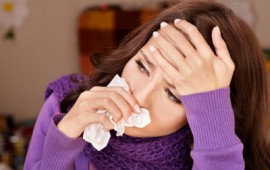What Is Contagious and What is Not?
Author: Shannon Miller Lifestyle

Do you ever wonder if that infection is contagious?
Do you wonder if a case of bronchitis or pneumonia could actually be passed around your household, or worry that your kids could catch a cough from a friend?
In a nutshell, viruses are contagious, as are bacterial infections.
Viruses are transferred in similar ways, usually through bodily fluids, such as mucus and saliva. One very important difference is that a virus cannot survive without a host organism. In other words, you are less likely to catch a virus from an object that a person has touched.
Conversely, a bacteria can survive on surfaces other than living organisms and can be spread easily through contact.
Here are some examples of viruses and bacterial infections that are contagious:
Virus |
Bacterial Infection |
| RSV or Viral Bronchitis | Bacterial Bronchitis |
| Common Cold | Tuberculosis |
| Gastroenteritis (stomach flu) | Upper Respiratory Infection |
| Croup | Strep Throat |
| Influenza | Bacterial Meningitis |
| Some ear infections | Pneumonia |
So, when am I not contagious?
Diseases caught from an animal, insect, or arachnid are not contagious. Examples would be Lyme Disease or West Nile Virus. An animal virus that has mutated to a human virus, such as Bird Flu or Swine Flu, would be contagious.
Usually, if a sinus infection is rooted in allergies or nasal inflammation, then it is not contagious. Sinus infections caused by bacteria are. Sometimes, pneumonia is caused by a contagion. Often, as in people who contract pneumonia by being overly sedentary, it is not.
If put on an antibiotic for a contagious infection, it is best to assume that you are contagious for the first 24 hours, until the antibiotic has taken effect. If the infection causes fever, the doctor will probably tell you that you are contagious until fever free for 24 hours.
Really, there is not a sure way to know that you are not contagious, or that your child is not contagious. If saliva or mucus still contains the virus or bacteria, then there is a chance that it would spread to someone else.
How do I keep from getting these viruses and bacterial infections?
- Keep your hands clean. Wash hands often, and clean them thoroughly.
- When you have to touch things in public, use caution. For instance, wipe off the handle of the shopping cart with a disinfecting wipe. In the bathroom, wash hands and then use a paper towel to open the door. Clean off gym equipment before and after use.
- Get in the habit of not touching your face as often.
- Cough into your sleeve instead of your hand.
- Eat healthy foods. Foods full of vitamins and minerals build immunity. Studies show that Vitamin C actually helps the immune system, and that Zinc actually helps the body recover from certain viruses.
- Get enough rest. When we are worn out, we are worn down and susceptible to disease.
- Meditate. A recent study actually shows that people who meditate daily have a stronger immune system than those who don’t.
